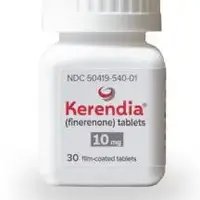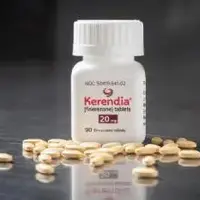Generic name: finerenone
Drug class: Aldosterone receptor antagonists
Dosage form: tablets
Availability: Prescription only
Pregnancy & Lactation: Risk data available
Brand names: Finerenone
What is Kerendia?
Kerendia (finerenone) is a FDA approved tablet taken once a day by adults who have chronic kidney disease from type 2 diabetes. Kerendia is used to slow down kidney damage, and also to reduce the risk of kidney failure, cardiovascular death, heart attack and being hospitalized for heart failure. Kerendia is from the class of meds called mineralocorticoid receptor antagonists.
Chronic kidney disease (CKD) is when your kidneys are not working properly and they work less effectively over time. Having type 2 diabetes increases your chances of having chronic kidney disease. Often type 2 diabetics do not have any symptoms in the early stages of CKD and they might not realize they have it until it is advanced and they may need to have dialysis or kidney transplant to survive. If you have diabetes it is important to get your kidneys checked regularly by having a blood and urine test, if you have signs of reduced kidney function or the start of CKD early treatment can help prevent you having extra health problems.
When you have CKD you have health problems from fluid, electrolytes (minerals required for many bodily processes), and waste building up in the body. If you have CKD you are also at high risk of heart disease.
How should I take Kerendia
Follow all directions on your prescription label and read all medication guides or instruction sheets. Your doctor may occasionally change your dose. Use the medicine exactly as directed.
You may take finerenone with or without food.
If you cannot swallow a tablet whole, crush the tablet and mix it with water or soft food such as applesauce. Swallow the mixture right away.
You will need medical tests.
Dosing information
Usual Adult Dose for Chronic Kidney Disease:
Initial dose:
For estimated glomerular filtration rate (eGFR) at least 60 mL/min/1.73 m2: 20 mg orally once a day
For eGFR 25 to less than 60 mL/min/1.73 m2: 10 mg orally once a day
Target dose:
20 mg orally once a day
Comments:
Initiation of therapy is not recommended if serum potassium is greater than 5 mEq/L.
If serum potassium levels are greater than 4.8 to 5 mEq/L, initiation of therapy may be considered with additional serum potassium monitoring within the first 4 weeks based on clinical judgment and serum potassium levels.
Initiation of therapy is not recommended in patients with eGFR less than 25 mL/min/1.73 m2.
Before Taking
You should not use Kerendia if you are allergic to it, or if you have problems with your adrenal gland.
Some drugs should not be used with this medicine. Your treatment plan may change if you also use:
- nefazodone;
- the antibiotics clarithromycin or telithromycin;
- antifungal medicine--itraconazole, ketoconazole, posaconazole, voriconazole; or
- antiviral medicine for HIV or hepatitis C--boceprevir, cobicistat, dasabuvir, elvitegravir, indinavir,
- lopinavir/ritonavir, nelfinavir, ombitasvir, paritaprevir saquinavir, telaprevir, tipranavir.
Tell your doctor if you have ever had:
- severe liver disease; or
- high blood levels of potassium (hyperkalemia).
It is not known if finerenone will harm an unborn baby. Tell your doctor if you are pregnant or plan to become pregnant.
You should not breastfeed while using finerenone, and for at least 1 day after your last dose.
Not approved for use by anyone younger than 18 years old.
What happens if I miss a dose?
Take the missed dose on the same day you remember it. Take your next dose at the regular time and stay on your once-daily schedule. Do not take 2 doses in one day.
What happens if I overdose?
Seek emergency medical attention or call the Poison Help line at 1-800-222-1222.
What should I avoid while using Kerendia?
Do not take potassium supplements or use salt substitutes, unless your doctor has told you to.
Grapefruit may interact with finerenone and cause side effects. Avoid consuming grapefruit products.
Kerendia side effects
Get emergency medical help if you have signs of an allergic reaction to Kerendia: hives; difficulty breathing; swelling of your face, lips, tongue, or throat.
Treatment with Kerendia may cause serious side effects. Call your doctor at once if you have:
- high blood potassium--nausea, weakness, tingly feeling, chest pain, irregular heartbeats, loss of movement; or
- low blood sodium--headache, confusion, problems with thinking or memory, weakness, feeling unsteady.
Common Kerendia side effects may include:
- high potassium;
- low sodium; or
- low blood pressure.
This is not a complete list of side effects and others may occur. Call your doctor for medical advice about side effects. You may report side effects to FDA at 1-800-FDA-1088.
See more: Kerendia Side EffectsWhat other drugs will affect Kerendia?
Many drugs can affect Kerendia, and some drugs should not be used at the same time. Tell your doctor or pharmacist about all other medicines you use. This includes prescription and over-the-counter medicines, vitamins, and herbal products.
You should not take Kerendia if you:
Take certain medications called CYP3A4 inhibitors. Ask your healthcare provider if you are not sure if you are taking any of these medications.
- Administration of Kerendia with strong inhibitors of CYP3A4 (such as clarithromycin, itraconazole, ketoconazole, voriconazole, posaconazole, voriconazole, ritonavir, lopinavir, cobicistat) should be avoided.
- Administration of Kerendia with moderate and weak inhibitors of CYP3A4 (such as amiodarone, erythromycin, fluconazole, diltiazem, verapamil, conivaptan) should only be used under medical supervision so that potassium levels can be monitored and dosages adjusted if needed.
Not all possible interactions are listed here, use the link below to check for other Kerendia drug interactions.





